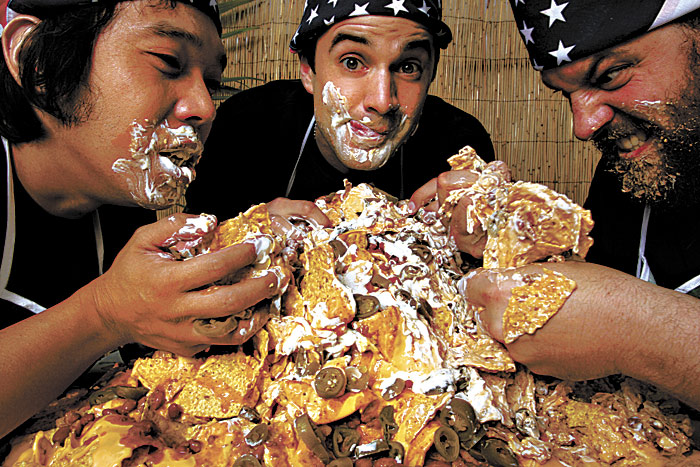If historical significance were measured purely in terms of fortuitous introductions, the Melvins would be akin to the Industrial Revolution.
When future Nirvana bassist Krist Novoselic met Melvins guitarist Buzz Osborne in 1983 while working at an Aberdeen Taco Bell, Osborne helped launch Novoselic’s hardcore education by loaning him records by Black Flag, Flipper, the Butthole Surfers, and Minor Threat. Shortly thereafter, Novoselic introduced Osborne to drummer Dale Crover when original Melvins drummer Mike Dillard stepped down. Once all those connections were established, the Melvins’ notoriously noisy practice sessions attracted all sorts of local admirers, including Novoselic’s friend Kurt Cobain. Crover would play drums very briefly with Nirvana, but when the band needed a permanent replacement in 1990, it was Osborne and Crover who facilitated an introduction to Dave Grohl.
Clearly, those fruitful encounters alone make the Melvins measurably monumental, but what ultimately makes them important is the wide-reaching influence of their sludgy sonic signature. 25 years and 17 albums later, it’s hard to imagine contemporary bands like Mastodon, Boris, or Isis even existing if it weren’t for the indelible impact of Osborne and Crover. Perhaps due to sheer heaviness, comparisons to Black Sabbath have followed the Melvins since their inception, but it’s the combination of that grounding in early American hardcore with abundance of affection for experimentation that’s at the heart of what defines them.
“When I first saw them, I think at either [the old Seattle venue] Gorilla Gardens or the Metropolis, they were quite a bit different than what they would become,” recalls Mudhoney/Green River frontman Mark Arm. “[It was] very direct and more punk-rock…and they had a different drummer. I would say their influences were more like [Portland-based punk outfit] the Wipers. They had great, catchy songs [and] quickly—almost immediately—became one of the best punk-rock bands in town, though they were from Aberdeen and Montesano. Once they changed drummers, all the experimentation started. And it’s just been going nonstop for years now, which is great.”
Arm’s own influential act, Green River, will help the Melvins celebrate their silver anniversary this weekend with two shows at Showbox at the Market on Friday, May 21 and Saturday, May 22. The Melvins will play two sets each night, the first featuring original drummer Dillard (with Crover on bass) and the second a start-to-finish performance of their 1993 album Houdini with Osborne and Crover (back on drums) joined by Trevor Dunn (Mr. Bungle, Fantomas) on bass. At press time, Friday’s 21-plus show is nearly sold out, and tickets for the Saturday all-ages show are going fast as well, so I’d strongly advise not waiting until the night of the show to grab yours.
Though they’ve been official members of the Melvins for nearly three years, Big Business‘ Coady Willis and Jared Warren aren’t able to join them for these shows—they’re currently touring in support of their impressive new album Mind the Drift (Hydra Head Records). Thanks to the Melvins’ continuing knack for serendipitous introductions, Willis is thrilled with the contributions of Big Business’ new(ish) third member, guitarist Toshi Kasai. “Toshi recorded the last few Melvins records; that’s how we met him. Originally, we took him on tour to do sound,” he explains. “He also did some keyboards and effects from the soundboard, but then we decided to quit farting around and just brought him into the band. We always wanted a guitar player, but someone who could do other noises and [play] other instruments if need be. And he has the voice of an angel!”
Angelic voices and supplemental instrumentation have helped create Big Business’ most progressive, dynamic, and entertaining release to date—one that might catch some longtime fans slightly off-guard. Their third full-length (and third executed with producer Phil Ek) retains Willis’ distinct, hard-hitting drumming style and Warren’s brutally beautiful voice and thunderclapping bass sound, but with a slew of unexpected, refreshing embellishments and a disarming amount of full-tilt hooks. “I think it’s a natural evolution,” says Willis of the expanded sound. “Nobody wants to make the same record every time. We’ve always been a band that changes as we go. Perhaps that will be our undoing, who knows? I don’t feel like it’s random, though; I feel like we’re definitely reaching for something.” Big Business will play Neumos just two nights after the Melvins’ anniversary shows, Monday, May 25.








